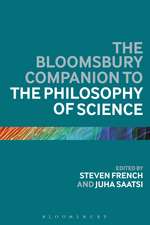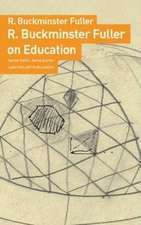Philosophy of Science: Key Concepts
Autor Steven Frenchen Limba Engleză Paperback – 27 ian 2016
| Toate formatele și edițiile | Preț | Express |
|---|---|---|
| Paperback (1) | 165.91 lei 3-5 săpt. | +54.93 lei 10-14 zile |
| Bloomsbury Publishing – 27 ian 2016 | 165.91 lei 3-5 săpt. | +54.93 lei 10-14 zile |
| Hardback (1) | 567.33 lei 6-8 săpt. | |
| Bloomsbury Publishing – 27 ian 2016 | 567.33 lei 6-8 săpt. |
Preț: 165.91 lei
Preț vechi: 205.91 lei
-19% Nou
Puncte Express: 249
Preț estimativ în valută:
31.75€ • 33.24$ • 26.27£
31.75€ • 33.24$ • 26.27£
Carte disponibilă
Livrare economică 15-29 martie
Livrare express 04-08 martie pentru 64.92 lei
Preluare comenzi: 021 569.72.76
Specificații
ISBN-13: 9781474245234
ISBN-10: 1474245234
Pagini: 240
Dimensiuni: 138 x 216 x 18 mm
Greutate: 0.34 kg
Ediția:Revised
Editura: Bloomsbury Publishing
Colecția Bloomsbury Academic
Locul publicării:London, United Kingdom
ISBN-10: 1474245234
Pagini: 240
Dimensiuni: 138 x 216 x 18 mm
Greutate: 0.34 kg
Ediția:Revised
Editura: Bloomsbury Publishing
Colecția Bloomsbury Academic
Locul publicării:London, United Kingdom
Caracteristici
Uses a conversational and light-hearted tone to introduce more technical topics such as falsification, realism and objectivity
Notă biografică
Steven French is Professor of the Philosophy of Science at the University of Leeds. He is the author of The Structure of the World (OUP 2014) and numerous other books and articles on the philosophy of science. He is also Co-Editor of The British Journal for the Philosophy of Science and of The Bloomsbury Companion to the Philosophy of Science.
Cuprins
1. Introduction 2. Discovery 3. Heuristics Exercise 14. Explanation 5. Justification Exercise 26. Observation 7. Experiment Exercise 38. Realism 9. Anti-Realism Exercise 410. Independence11. Gender Bias Exercise 512. Where we've been and Where to Go for More? Further ReadingNotesIndex
Recenzii
If philosophy of science baffles you, this book offers the key to unlock its mysteries. Written by a leading scholar in the field, it provides a superb introduction to core topics ranging from scientific discovery to gender bias. This book is a must-read for anyone interested in philosophical issues relating to scientific knowledge.
The greatest strength of this book is the use of illustrations from the history of science and of quotations from scientists, to illuminate the various issues facing those who would like to think clearly about the methods, backing, and legitimacy of the sciences. Beginning students are introduced effectively to the tensions among the articulations of scientific practice by scientists themselves. I expect that this will lead many of them to appreciate the distinctive role of philosophers of science.
Philosophy of Science: Key Concepts is a lively, engaging and comprehensive introduction to philosophy of science, written by one of its best contemporary practitioners. Steven French explains the mechanics of science by focusing on episodes from past and current scientific practice. He weaves the web of the major concepts that constitute the tools of the philosophical understanding of science and unravels their rich content. This book is like no other introduction I have read in making a complex conceptual terrain accessible to, and viable for, the uninitiated. A masterly achievement.
This is a wonderful book. It engages students with an infectious enthusiasm for science and philosophy, built on provocative examples, fascinating history, patient explanations, and no small amount of good humor. French has a terrific knack for unpacking challenging ideas in an intuitive way, without jargon, and yet rigorously.
In this clearly written, well-organized revision of his Science: Key Concepts in Philosophy (2007), French (philosophy of science, Univ. of Leeds, UK) provides a discussion that is cutting edge in terms of breaking discoveries. He synthesizes knowledge of entire scientific disciplines-physics, astronomy, genetics, biology, math, medicine, chemistry, paleontology, primatology, psychology, and so on-into a coherent, astute account of the whole, presenting the major philosophical concepts of "how science works." He looks at, among much else, how scientific theories are discovered; how they explain phenomena and reality; why, as Alfred North Whitehead said, one cannot know something unless one can measure it; what roles social and political factors play in scientific practice; whether science can ever be purely independent of its social context; the relation between truth, scientific theories, and scientific confirmation; how scientists come to grips with the uncertainty illustrated by the history of changing scientific theories; how social factors in general influence the objectivity of science; and how gender bias impacts science. The best introduction to date to the philosophy of science, the volume includes excellent suggested readings.Summing Up: Essential. All readers.
The greatest strength of this book is the use of illustrations from the history of science and of quotations from scientists, to illuminate the various issues facing those who would like to think clearly about the methods, backing, and legitimacy of the sciences. Beginning students are introduced effectively to the tensions among the articulations of scientific practice by scientists themselves. I expect that this will lead many of them to appreciate the distinctive role of philosophers of science.
Philosophy of Science: Key Concepts is a lively, engaging and comprehensive introduction to philosophy of science, written by one of its best contemporary practitioners. Steven French explains the mechanics of science by focusing on episodes from past and current scientific practice. He weaves the web of the major concepts that constitute the tools of the philosophical understanding of science and unravels their rich content. This book is like no other introduction I have read in making a complex conceptual terrain accessible to, and viable for, the uninitiated. A masterly achievement.
This is a wonderful book. It engages students with an infectious enthusiasm for science and philosophy, built on provocative examples, fascinating history, patient explanations, and no small amount of good humor. French has a terrific knack for unpacking challenging ideas in an intuitive way, without jargon, and yet rigorously.
In this clearly written, well-organized revision of his Science: Key Concepts in Philosophy (2007), French (philosophy of science, Univ. of Leeds, UK) provides a discussion that is cutting edge in terms of breaking discoveries. He synthesizes knowledge of entire scientific disciplines-physics, astronomy, genetics, biology, math, medicine, chemistry, paleontology, primatology, psychology, and so on-into a coherent, astute account of the whole, presenting the major philosophical concepts of "how science works." He looks at, among much else, how scientific theories are discovered; how they explain phenomena and reality; why, as Alfred North Whitehead said, one cannot know something unless one can measure it; what roles social and political factors play in scientific practice; whether science can ever be purely independent of its social context; the relation between truth, scientific theories, and scientific confirmation; how scientists come to grips with the uncertainty illustrated by the history of changing scientific theories; how social factors in general influence the objectivity of science; and how gender bias impacts science. The best introduction to date to the philosophy of science, the volume includes excellent suggested readings.Summing Up: Essential. All readers.













